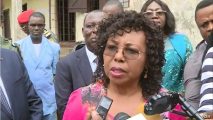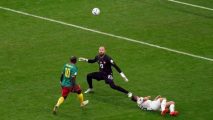Categories
Recent Posts
- Biya regime pledges to repay 616M CFA Francs to Baccalaureate examiners
- France: Marine Le Pen barred from running for public office for five years
- FECAFOOT: Unity prevails amid Eto’o-Brys tensions
- Yaoundé: EYUMEMA welcomes Honorable Rose Abunaw
- CPDM Covid Scandal: Prosecutor seeks 10-Year ban for 4 officials
Archives
- March 2025
- February 2025
- January 2025
- December 2024
- November 2024
- October 2024
- September 2024
- August 2024
- July 2024
- June 2024
- May 2024
- April 2024
- March 2024
- February 2024
- January 2024
- December 2023
- November 2023
- October 2023
- September 2023
- August 2023
- July 2023
- June 2023
- May 2023
- April 2023
- March 2023
- February 2023
- January 2023
- December 2022
- November 2022
- October 2022
- September 2022
- August 2022
- July 2022
- June 2022
- May 2022
- April 2022
- March 2022
- February 2022
- January 2022
- December 2021
- November 2021
- October 2021
- September 2021
- August 2021
- July 2021
- June 2021
- May 2021
- April 2021
- March 2021
- February 2021
- January 2021
- December 2020
- November 2020
- October 2020
- September 2020
- August 2020
- July 2020
- June 2020
- May 2020
- April 2020
- March 2020
- February 2020
- January 2020
- December 2019
- November 2019
- October 2019
- September 2019
- August 2019
- July 2019
- June 2019
- May 2019
- April 2019
- March 2019
- February 2019
- January 2019
- December 2018
- November 2018
- October 2018
- September 2018
- August 2018
- July 2018
- June 2018
- May 2018
- April 2018
- March 2018
- February 2018
- January 2018
- December 2017
- November 2017
- October 2017
- September 2017
- August 2017
- July 2017
- June 2017
- May 2017
- April 2017
- March 2017
- February 2017
- January 2017
- December 2016
- November 2016
- October 2016
- September 2016
- August 2016
- July 2016
- June 2016
Featured
Most Commented Posts
 4 Anglophone detainees killed in Yaounde
4 Anglophone detainees killed in Yaounde
18 comments Chantal Biya says she will return to Cameroon if General Ivo Yenwo, Martin Belinga Eboutou and Ferdinand Ngoh Ngoh are sacked
Chantal Biya says she will return to Cameroon if General Ivo Yenwo, Martin Belinga Eboutou and Ferdinand Ngoh Ngoh are sacked
13 comments The Anglophone Problem – When Facts don’t Lie
The Anglophone Problem – When Facts don’t Lie
12 comments Anglophone Nationalism: Barrister Eyambe says “hidden plans are at work”
Anglophone Nationalism: Barrister Eyambe says “hidden plans are at work”
12 comments Largest wave of arrest by BIR in Bamenda
Largest wave of arrest by BIR in Bamenda
10 comments
Latest Tweets
Featured
-

Biya regime pledges to repay 616M CFA Francs to Baccalaureate examiners
-

France: Marine Le Pen barred from running for public office for five years
-

FECAFOOT: Unity prevails amid Eto’o-Brys tensions
-

Yaoundé: EYUMEMA welcomes Honorable Rose Abunaw
-

CPDM Covid Scandal: Prosecutor seeks 10-Year ban for 4 officials
-

Cameroon still faces power cuts despite full output from Nachtigal Dam
-

Financial scandal rocks Mkpot Oil Mill Project!! Manyu Chiefs won’t talk
© Cameroon Concord News 2025





16, October 2024
Biya’s imaginary return to Yaoundé has not occurred 0
The expected return of Cameroon’s president Paul Biya to Yaoundé has not occurred. Financial markets are reacting to growing concerns about his health, while several key government figures have been called to Geneva.
What happened on 13 October? In Yaoundé, Cameroon, while supporters of the Rassemblement Démocratique du Peuple Camerounais (RDPC, the ruling party) and members of youth organisations had been discreetly mobilised to welcome President Paul Biya at the airport, the arrangements were scrapped a few hours later, with the same discretion. And with good reason: the Cameroonian president did not return to the country and is still in Europe. But where?
Imaginary homecoming
No announcement has been made about Biya’s aborted return or the reasons. But this latest development has heightened doubts about the president’s condition, after September and October saw him cancel his participation in the United Nations General Assembly, the International Organisation of La Francophonie (OIF) summit and the meeting on sustainable development in Hamburg, Germany.
Faced with rumours of the president’s death spread by a television channel close to the Ambazonian separatists and widely reported on social networks, the Cameroonian presidency and government were forced to make a public statement on 8 October, explaining that the head of state was continuing his stay in Switzerland, was in perfect health and would return to Cameroon “in the very near future”. That was a week ago.
“The head of state had never planned to return this Sunday [13 October],” said a source close to the presidency, who confirmed that no members of the presidential guard or the presidential security directorate responsible for accompanying the head of state on his travels had been mobilised for this trip. According to our sources, airport authorities were not alerted to any movement of CM-001, the code reserved for President Biya.
Budgetary emergencies
As a result, public suspicions have returned with a vengeance. According to one of the most persistent rumours, Biya has been hospitalised for at least two weeks in an ultra-secure VIP wing of the Percy military hospital in Clamart, near Paris. Cameroon’s ambassador to France, André Magnus Ekoumou, denied this to Jeune Afrique. “Paul Biya has never been hospitalised in Paris or anywhere else. He is in Geneva and in good health,” he said.
Then the influential territorial administration minister Paul Atanga Nji provoked more tension by declaring a ban on debates about the president’s condition in the Cameroonian media. In the same vein, land and property minister Henri Eyebe Ayissi announced that he would organise a day of prayer for Biya at Yaoundé’s Palais des Sports on 17 October. This was subsequently cancelled on the orders of Biya’s private office, led by Samuel Mvondo Ayolo.
These initiatives have annoyed some members of the presidential entourage, since they contribute to the climate of mistrust surrounding their boss. On 13 October, Finance Minister Louis-Paul Motaze, who is also expected in Brussels in the next few days, and Senate Vice-President Aboubakary Abdoulaye were summoned to Geneva. On 14 October, they were joined by Senate President Marcel Niat Njifenji, who had just been discharged from the American Hospital in Paris, accompanied by a delegation of three officials from the upper house.
According to our sources, these summonses correspond to a working meeting officially organised to draw up the budget, which was due to be signed by the president in early August. To make up for the delay, it must be finalised before the plenary session of the National Assembly and Senate, scheduled for November. For his part, Njifenji will have to work with his Senate colleagues from Geneva to manage some of the tensions that are threatening the upper house with implosion.
The uncertainty surrounding the drafting of the state budget is also worrying international agencies. Uncertainty about Biya’s health is affecting Cameroon’s ability to borrow as well as increasing the perceived risk of political instability.
With foreign debt repayments imminent and economic operators awaiting clarification, it looks as though the head of state preferred organising the summit meeting in Switzerland over not holding it at all. To date, Biya has no concrete plans to return to Yaoundé.
Culled from The Africa Report